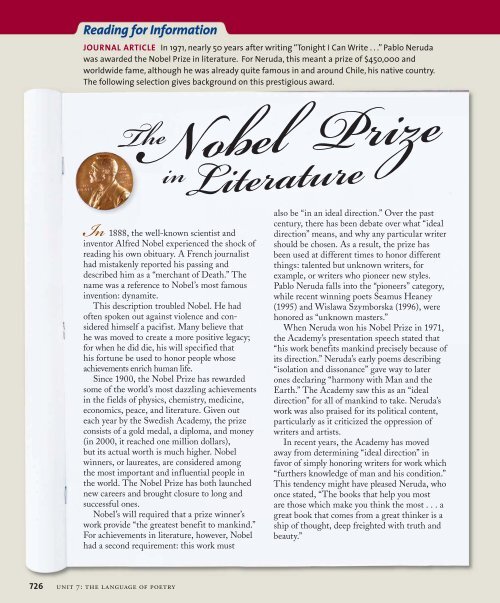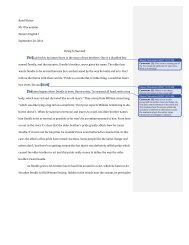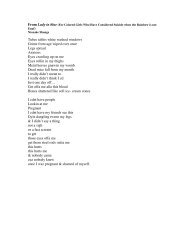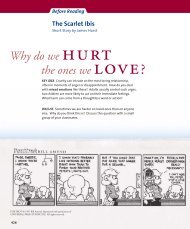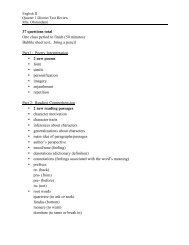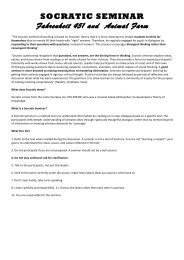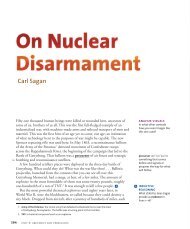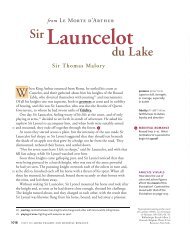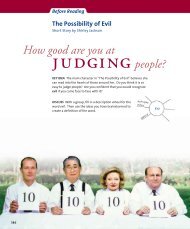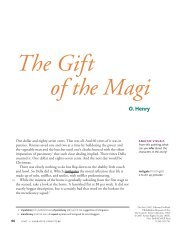The Language of Poetry - LanguageArts-NHS
The Language of Poetry - LanguageArts-NHS
The Language of Poetry - LanguageArts-NHS
Create successful ePaper yourself
Turn your PDF publications into a flip-book with our unique Google optimized e-Paper software.
Reading for Information<br />
JOURNAL ARTICLE In 1971, nearly 50 years after writing “Tonight I Can Write . . .” Pablo Neruda<br />
was awarded the Nobel Prize in literature. For Neruda, this meant a prize <strong>of</strong> $450,000 and<br />
worldwide fame, although he was already quite famous in and around Chile, his native country.<br />
<strong>The</strong> following selection gives background on this prestigious award.<br />
<strong>The</strong><br />
In 1888, the well-known scientist and<br />
inventor Alfred Nobel experienced the shock <strong>of</strong><br />
reading his own obituary. A French journalist<br />
had mistakenly reported his passing and<br />
described him as a “merchant <strong>of</strong> Death.” <strong>The</strong><br />
name was a reference to Nobel’s most famous<br />
invention: dynamite.<br />
This description troubled Nobel. He had<br />
<strong>of</strong>ten spoken out against violence and considered<br />
himself a pacifist. Many believe that<br />
he was moved to create a more positive legacy;<br />
for when he did die, his will specified that<br />
his fortune be used to honor people whose<br />
achievements enrich human life.<br />
Since 1900, the Nobel Prize has rewarded<br />
some <strong>of</strong> the world’s most dazzling achievements<br />
in the fields <strong>of</strong> physics, chemistry, medicine,<br />
economics, peace, and literature. Given out<br />
each year by the Swedish Academy, the prize<br />
consists <strong>of</strong> a gold medal, a diploma, and money<br />
(in 2000, it reached one million dollars),<br />
but its actual worth is much higher. Nobel<br />
winners, or laureates, are considered among<br />
the most important and influential people in<br />
the world. <strong>The</strong> Nobel Prize has both launched<br />
new careers and brought closure to long and<br />
successful ones.<br />
Nobel’s will required that a prize winner’s<br />
work provide “the greatest benefit to mankind.”<br />
For achievements in literature, however, Nobel<br />
had a second requirement: this work must<br />
726 unit 7: the language <strong>of</strong> poetry<br />
N obel Prize<br />
inLiterature<br />
also be “in an ideal direction.” Over the past<br />
century, there has been debate over what “ideal<br />
direction” means, and why any particular writer<br />
should be chosen. As a result, the prize has<br />
been used at different times to honor different<br />
things: talented but unknown writers, for<br />
example, or writers who pioneer new styles.<br />
Pablo Neruda falls into the “pioneers” category,<br />
while recent winning poets Seamus Heaney<br />
(1995) and Wislawa Szymborska (1996), were<br />
honored as “unknown masters.”<br />
When Neruda won his Nobel Prize in 1971,<br />
the Academy’s presentation speech stated that<br />
“his work benefits mankind precisely because <strong>of</strong><br />
its direction.” Neruda’s early poems describing<br />
“isolation and dissonance” gave way to later<br />
ones declaring “harmony with Man and the<br />
Earth.” <strong>The</strong> Academy saw this as an “ideal<br />
direction” for all <strong>of</strong> mankind to take. Neruda’s<br />
work was also praised for its political content,<br />
particularly as it criticized the oppression <strong>of</strong><br />
writers and artists.<br />
In recent years, the Academy has moved<br />
away from determining “ideal direction” in<br />
favor <strong>of</strong> simply honoring writers for work which<br />
“furthers knowledge <strong>of</strong> man and his condition.”<br />
This tendency might have pleased Neruda, who<br />
once stated, “<strong>The</strong> books that help you most<br />
are those which make you think the most . . . a<br />
great book that comes from a great thinker is a<br />
ship <strong>of</strong> thought, deep freighted with truth and<br />
beauty.”


